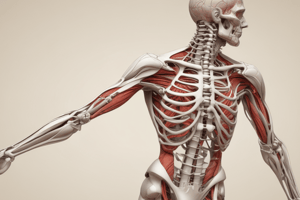Podcast
Questions and Answers
How many pairs of chromosomes do humans typically have?
How many pairs of chromosomes do humans typically have?
- 25 pairs
- 23 pairs (correct)
- 30 pairs
- 20 pairs
What is heredity?
What is heredity?
- The transmission of traits from parents to offspring (correct)
- The transmission of traits from environment to offspring
- The transmission of traits from friends to offspring
- The transmission of traits from siblings to parents
What do genes carry?
What do genes carry?
- Physical traits
- Hereditary traits (correct)
- Environmental traits
- Behavioral traits
What determines whether a recessive gene is expressed?
What determines whether a recessive gene is expressed?
What is the primary factor that affects physical development after conception?
What is the primary factor that affects physical development after conception?
What type of chromosomes determines the sex of an individual?
What type of chromosomes determines the sex of an individual?
What is part of the physical self?
What is part of the physical self?
When does physical efficiency generally peak?
When does physical efficiency generally peak?
What is a crucial stage of development?
What is a crucial stage of development?
Who outlined the stages of life span?
Who outlined the stages of life span?
What is the stage of life span from 2 weeks of life to 2nd year?
What is the stage of life span from 2 weeks of life to 2nd year?
What is the stage of life span from 14 to 18 years old?
What is the stage of life span from 14 to 18 years old?
What is the perspective of sociologists and anthropologists?
What is the perspective of sociologists and anthropologists?
What is the perspective of socio-biologists and psychologists?
What is the perspective of socio-biologists and psychologists?
Flashcards are hidden until you start studying
Study Notes
Physical Self
- Refers to the body that includes basic parts such as head, neck, arms, and legs.
- Made up of other organs such as the brain, heart, lungs, stomach, intestines, and muscles.
- In general, the body performs its functions least well during infancy and old age.
- Physical efficiency generally peaks in early adulthood and declines into middle age.
- Physical development and growth during childhood continue at a slow rate compared with rapid rate of growth in babyhood.
- One of the most crucial stages of development is the adolescence stage, which begins with the onset of puberty and is characterized by rapid physical changes.
Life Span
- Elizabeth B. Hurlock outlined the stages of life span or development from conception to death.
- She divided the stages into 10 parts:
- Prenatal: Fertilization to birth
- Infancy: Birth to 2 weeks of life
- Babyhood: 2 weeks of life to 2nd year
- Early childhood: 2 to 6 years old
- Late childhood: 6 to 10 or 12 years old
- Puberty: 10 or 12 to 14 years old
- Adolescence: 14 to 18 years old
- Early adulthood: 18 to 40 years old
- Middle adulthood: 40 to 60 years old
- Late adulthood: 60 to death
Factors Affecting Physical Growth
- Human Nature (Nature) vs. Nurture:
- Nature: Socio-biologists, psychologists, and others in the natural sciences argue that behavior traits can be explained by genetics.
- Nurture: Sociologists, anthropologists, and others in the social sciences argue that human behavior is learned and shaped through interaction.
Heredity
- The biological process of transmission of traits from parents to offspring.
- The sex and other physical traits are determined by the combination of chromosomes and genes during fertilization.
Chromosomes
- Thread-like tissue that carries genes, and are usually found in pairs.
- A human typically has 23 pairs of chromosomes.
- 2 types:
- Autosome or trait chromosomes (22 pairs)
- Gonosome or sex chromosomes (the X and Y)
Genes
- Basic carriers of hereditary traits.
- Can be classified into:
- Recessive (weak genes): The trait not expressed when the dominant form of the trait is present.
- Dominant (strong genes): The expressed form of the trait when present (even if it's just 1 allele)
Environment
- Refers to the factors to which the individual is exposed after conception to death, which includes learning and experience.
- Factors such as diet, nutrition, and diseases play an important role in physical development.
Studying That Suits You
Use AI to generate personalized quizzes and flashcards to suit your learning preferences.




